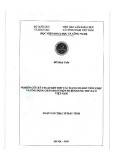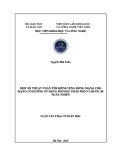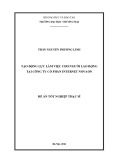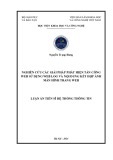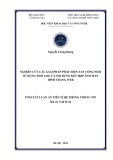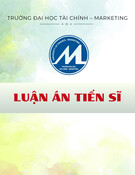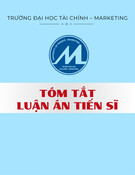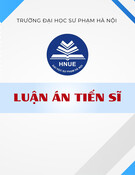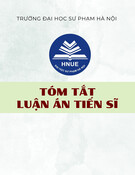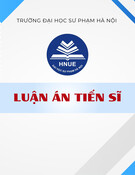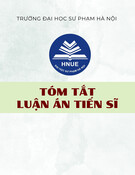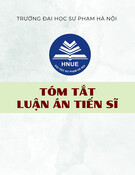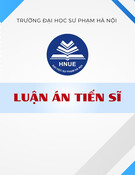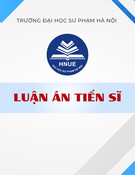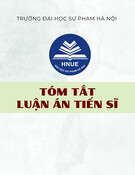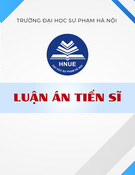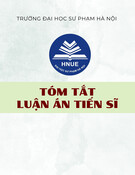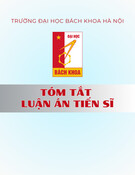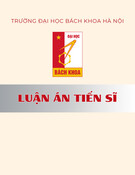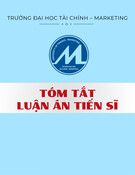
An investigation into the role of moderating variables on
mobile broadband technology acceptance in Indonesia
A thesis submitted in fulfilment of the requirement for the degree
of Doctor of Philosophy
Priyantono Rudito
Master of Business (Marketing), Bachelor of Industrial Engineering
Senior Supervisor: Associate Professor Adela J McMurray
Second Supervisor: Dr Christopher White
Graduate School of Management, RMIT University
Business Portfolio
RMIT University
2 0 1 0

Declaration
I certify that except where due acknowledgement has been made, the work is that of the author
along; the work has not been submitted previously, in whole or in part, to qualify for any other
academic award; the content of the thesis is the result of work which has been carried out since
the official commencement date of the approved research program; any editorial work, paid or
unpaid, carried out by a third party is acknowledged; and, ethics procedures and guidelines
have been followed.
_____________________
Priyantono Rudito
Date: 01 October 2010

-i-
ABSTRACT
This thesis involved an examination of the impact of moderator variables on the extended
technology acceptance model with the aim of developing a more integrative framework for
understanding mobile broadband technology acceptance in Indonesia. The absence of an
integrative model that incorporates other types of variables, such as moderator factors, in the
current literature indicates the importance of developing such a framework. The research
design of this thesis was based in part on a comprehensive literature review, followed by a
pre-test, a pilot study and the main study, which yielded 704 responses. The study identified
three main variables that potentially have a moderating influence on the Technology
Acceptance Model (TAM). These are individual culture value orientation, customer perceived
value (CPV) and demographic factors. Furthermore, the most recently developed model in
the field, the TRAM (Technology Readiness and Acceptance Model), was also examined for
its potential as a baseline model for testing the moderator variables. A comparison between
the TRAM and the original TAM was conducted based on structural equation modelling
(SEM) fit examination procedures, the results of which revealed that only the TAM part of the
TRAM was valid for implementation in the present research.
The high and low groups of CPV, individual cultural orientation and demographic data were
used to develop unconstrained structural high and low data group models, a constrained
model and a partially constrained model, to which chi-square difference tests were then
applied. The results of these tests indicated whether the differences in the hypothesised
relationships in the research model were significant across the groups. A significant result
confirmed the influence of some of the moderator variables. These included the conservation
and openness to change cultural orientations, which were measured based on Schwartz’s
Value System (SVS). Openness to change was proven to moderate two of the three
relationships in TAM. It significantly moderated the relationships between perceived
enjoyment (PE) and usage intention (UI) and between perceived ease of use (PEOU) and UI.

-ii-
The moderating influence of openness to change on the relationship between perceived
usefulness (PU) and UI was found to be insignificant. An interesting finding was obtained by
testing the moderating influence of conservatism. Although significant evidence was found to
support that conservatism moderated the technology acceptance model overall, no
significant results were identified confirming a moderating influence of openness to change
on the PE–UI, PU–UI and PEOU–UI relationships. A significant result was obtained for the
relationship between PU and PE, where conservatism demonstrated a moderating influence.
In addition, ‘technology readiness’ was revealed to have a moderating role, rather than
performing as a primary antecedent variable within TAM as previously suggested by TRAM
research. The moderating influence test results showed that technology readiness
moderated the relationships between PE and UI, PU and UI, and also between PEOU and
UI.
These findings led to the development of a more integrative model for understanding mobile
broadband technology acceptance in Indonesia. This model can be seen to provide
researchers and practitioners alike with invaluable new knowledge needed to enhance
technology investment and deployment, new product development, market education, and
marketing programs.

-iii-
ACKNOWLEDGEMENTS
In the name of Allah, the Most Gracious, the most Merciful
Undertaking the RMIT PhD program has been an unforgettable experience. It is not only
about obtaining an academic degree. More meaningful than that, it has been an invaluable
opportunity for me to embrace a world of knowledge and learning that I have been very
thankful to experience. I feel that the rigorous learning process I have been through in this
program has been essential to build my understanding about what the research is all about
and how it relates to the ‘real world’ of industry and daily life.
I have thoroughly enjoyed my time in this program and at RMIT, so have great pleasure in
having this opportunity to thank those who made this thesis possible.
Firstly, I am wholeheartedly thankful to my first supervisor, Associate Professor Adela J.
McMurray, whose patience, encouragement, guidance, attention and support from the start
has helped and encouraged me in understanding what is required of the PhD program.
Special thanks and deepest appreciation to my second supervisor, Dr Christopher White, for
his continuous support at every stage of my PhD program. I spent so many hours at his
office, taking up his time and absorbing his exceptional knowledge on the many subjects I
needed to master in conducting my research properly and professionally. The patience he
has shown in teaching me to understand structural equation modelling in particular is
extraordinary.
I would also like to express my gratitude to Professor George Cairns, Head of the School of
Management, Professor Brian Corbitt, Head of the School of Business IT and Logistics,
Professor Kosmas Smyrnios, and Professor Fang Lee Cooke, Deputy Head, Research and
Innovation for their support and the knowledge they shared with me, both formally in the
lecture and workshop classes, and informally in discussions outside of class.
My sincerest thanks also go to Professor A. Parasuraman, Vice Dean of the Faculty and
Editor, Journal of Service Research. University of Miami, and Professor Jan-Benedict E. M.
Steenkamp, C. Knox Massey Distinguished Professor of Marketing and Marketing Area
Chair, Kenan-Flagler Business School, UNC-Chapel Hill for the feedback and email
discussions I had with them about technology readiness and marketing in relation to my
research model.




